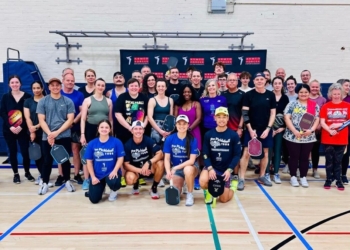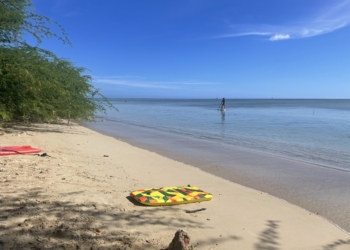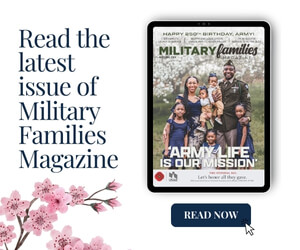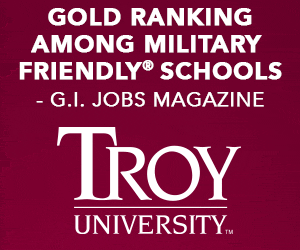Every PCS move is an opportunity for military families to make major decisions about maintaining or changing the way they live – on or off post? Upsize or downsize? What to bring and what to replace? One question that you may not have been asking is, how can we use this move to have a more sustainable living?
Setting up a household every few years is not only expensive, it can be wasteful. Many military families are caught in a cycle of store up, clear out to move, then buy again. However, as our communities become more aware of a need to curb a throwaway lifestyle to protect our vital resources, a PCS can be a great time to make a firm commitment to buying less, recycling and reusing more.

Tara Najim is an educator and author who, in her journey to live a more sustainable lifestyle started a Facebook group and became certified in permaculture design. Pam Mercer is using her professional knowledge, including over 10 years working in conservation education, to run the website Greenily to help families live a more eco-friendly life. We worked together to come up with five ways military families can use their next PCS move to embrace sustainability.
Reuse, reduce, recycle while packing
Every military family knows that there are certain items that simply cannot be moved, such as any type of liquid or light bulbs. If friends or neighbors do not want these items, Mercer suggests checking with local churches or nonprofits to see if they could use the items before disposing. Next, consider setting up your new home with greener household cleaners or toiletries. Start by making a list of what you’d be willing to budget for and try swapping out a few items with each move. For example, try paraben-free shampoos in bottles made from recycled plastic when stocking your shower.
Or, maybe it’s time to learn about greener household cleaners. With a larger budget, Mercer suggests checking out The Environmental Working Group for lists of safe options. To save money, Najim says learning how to make DIY cleaners can be “significantly cheaper than anything you can buy at the store, and only take a few minutes to make.” She adds, with homemade cleaners from items such as vinegar or essential oils, “you can feel fine about pouring the remainder down the drain and bringing your reusable spray bottle with you.”
End the cycle of rebuying
With our last move, I realized I hadn’t used my waffle iron in years. While we had fun making fancy waffles when we first got married, it’s a lot easier to throw pancakes on, so I made the commitment that even if I wanted to make them in the future, I wouldn’t replace it (It was a pain to clean anyway).
Don’t throw something out if you think you will use it in the future – you are adding waste and unnecessary expense to your household. For instance, we have a lawnmower simply waiting in the garage until we live somewhere with grass again, because we know that’s a possibility. However, if something has been in a box for two moves and collecting multiple TMO tags, go ahead and part with it. Then, make the firm decision to not repurchase something similar. I’ve cut down on my book and DVD buying by asking myself, ‘will we really read or watch this again?’ or ‘is it something I need for teaching?’ Instead, I use library sales or used book stores to both purchase and donate, relying more on our local library.
And don’t forget all of the resources available to military families! For my daughter’s recent birthday, I was able to rent two tables and chairs for each for around $14 from MWR. Afterwards we cleaned and returned them, saving us money and storage space. While I’ve been to a variety of clothing and book swaps, Mercer suggests a household items swap meet. This could be a great opportunity for an FRG or other social group. Host a decorating swap where military families bring picture frames, curtains, table settings, and seasonal decorations they can no longer use and offer for trade or donate to a nonprofit that helps people set up homes. Owning less will make moving less of a hassle, and may allow you to downsize, saving more money for travel or a permanent home after retirement or ETS.
Organize a sustainable closet
Military families may live in a variety of climates throughout their years of service, and if you add children and uniforms to this mix – there’s a lot of clothes. Mindful shopping is a small way you can increase sustainability through both eco-friendly and ethical purchasing. Mercer and Najim both suggest investing a little more in clothing that will last and have multiple uses for a longer term payoff than fast fashion.
Mercer says creating a “capsule wardrobe” where basics and layering pieces of good quality can be used to make a variety of outfits. And, Najim adds that purchasing sustainable materials, such as organic cotton or clothing made from recycled materials can help cut down on “enormous waste streams and pollutants” that come from the manufacturing of clothing.
For seasonal pieces or children’s clothing that is outgrown more often, both suggest thrift stores, clothing swaps, or online communities for both finding and selling. If you need to clear out clothing items that cannot be worn anymore due to staining, holes, or simply being worn out, don’t simply throw away or attempt to donate, instead find a way to recycle. Najim shares H&M’s clothing recycle program takes a variety of fabric items.
TIP: Check for regional opportunities for textile recycling, such as Blue Jeans Go Green, Planet Aid recycling bins, Green Zone, or American Textile Recycling Service.
Eliminate waste in the kitchen
For many military families, the kitchen is a beast to both pack and unpack, and each move might drastically change the amount of space you have, from a galley kitchen in a big city, to a huge one in a suburb. As our plasticware doesn’t make it, we replace them with more durable glass containers, and as Mercer and Najim point out, these do not discolor, leach toxins into food, and last longer. Many companies sell replacement lids for longer lasting glass or metal containers. We bought a cooler that had a four place picnic set of plates and eating utensils, and paired with a thermos for each family member, limiting the amount of single use table service items we need when we move. We eliminate the need for plastic wrap and other single use items through Bees Wrap and silicon straws and bags, and we haven’t bought a roll of paper towels in around two years by simply keeping a tote of old towels and linens (even single socks for dusting) in our pantry, and a basket of cloth napkins on the counter.
In my twenties, I loved single use mops and dusters, but when I spent the money to upgrade to a nice steam mop that I can move and use for a multitude of surfaces, I found it to be much more effective, both in use and cost. Another DIY project is learning to fix, rather than replace, small appliances in the kitchen any elsewhere. I learned how to fix the remote sensor on my television from Youtube, with replacement parts under $10, and have replaced the bowl on my food processor twice, allowing it to last over 10 years.
TIP: Once you reach your destination, make sure to find a recycling service in addition to trash pickup, and if you have an outdoor space, consider composting.
Embrace the environment around you
A commitment to a greener lifestyle is not only about the products we have in our house, but improving our relationship to nature and the resources we use. I would love to have a swing set or other large outdoor play and exercise items for my family, but instead we’ve chosen smaller items that can be moved, like a water table and toy gardening equipment.
We also joined a YMCA and looked for housing near recreational sites. Visiting recreational areas, such as National Parks, local hiking trails, and beaches can provide quality time outdoors with our families and by responsibly visiting and taking out what we bring in we show leadership and support for sustaining these places. Farmers’ markets, community gardens, and volunteer opportunities can, as Mercer shares, “help provide prospective” on the importance of people over things and help us feel at home in our new communities.

TIP: Military families get free access to national parks. Check out the full list of locations at Thanking America’s Armed Forces.
We still have a long way to go, and while you would not walk in our house and mistake us for minimalists, I did have a packer tell me last time that the lack of clutter and the way it was organized made it one of the easiest moves they had done. I floated on this compliment for days, and unpacking was easier too.
For a family under the stress of a move, taking the time to think about how our behavior impacts the environment can be difficult if it feels like we are giving up a convenience or making little to no impact in the grand scheme of things. Though Mercer explains, “There are countless easy ways to a little greener. It doesn’t have to be all or nothing. And it doesn’t have to be perfect.”
The benefits can be for our health and budget in addition to our communities.
Read comments













































